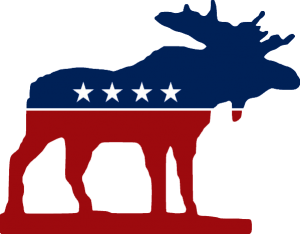
The history of third parties in American politics is rather vague and for the most part, quite easily overlooked. In most elections, third parties receive a tremendously small percentage of the total popular vote. The Republican and Democrat parties dominate politics. One particular year in which a third party played a great role in the national presidential election was 1912. This election actually pitted four major candidates against each other. Eugene Debs ran for the Socialist party, Woodrow Wilson was the Democratic nominee and then there were the Republicans. The Grand Old Party was split in 1912 between the conservative “Old Guard” and the younger “Progressives”. However, the party was split over more than simple doctrine. The incumbent president and an American political giant, once two good friends, were at the forefront of the feud.
In 1904, when then-President Theodore Roosevelt announced his intent to run for reelection he also announced something else. He declared that he would not run for reelection in 1908. He came to regret that declaration but due to his promise he refrained from running in 1908, despite the notion that had he run, he would most certainly win a third term. He did not run himself for President in 1908 but he did not stop campaigning. He set his Secretary of War, William Howard Taft, on the road to the White House. Taft defeated William Jennings Bryan in 1908, much due to Roosevelt’s ardent campaigning in his favor.
When Taft was elected in 1908 Roosevelt assumed that Taft would stay true to Roosevelt’s more progressive vision. Instead, Taft betrayed TR and favored the more conservative sections of the Congress. He and Roosevelt soon grew further apart. By 1912, the two good friends were now rivals for the Republican nomination. It is incredibly difficult to win the nomination over an incumbent President and Roosevelt learned this the hard way. Taft received the Republican nomination. Roosevelt was not finished fighting though. He decided to break away completely from the G.O.P and start his own party, one where he was the nominee.
So began the “Progressive Insurgency”. Roosevelt established the National Progressive Party. After remarking that he felt like a “bull moose” for starting his own political party, the Progressive Party was nicknamed the Bull Moose Party. You guessed it, the G.O.P was an elephant, the Dems were donkeys and the Progressives were represented by the Bull Moose.
Roosevelt’s schism with the Old Guard Republicans proved disastrous. He drove the Republican voters apart and Wilson won handily. Taft and Debs never had a chance. Roosevelt would have had a shot at the White House had he been nominated by the G.O.P establishment. Instead his chances at the presidency were dashed, for both 1912 and 1916.
The 1912 presidential election was one of the most important in American history. Had Roosevelt won in 1912, which although unlikely was more likely than a victory for Taft, world history could have changed. In 1914, when World War I broke out, Woodrow Wilson declared America neutral in the conflict. Had Roosevelt won in 1912 he may have favored intervention. This was the man who wanted America to crush Spain in 1898 and the same man who mediated the Russo-Japanese War in 1905. Whether for peace or war, Roosevelt would hardly have let the European catastrophe continue long without American involvement. Had American troops become involved in France as soon as 1914 or 1915 there is no telling what could have happened.
